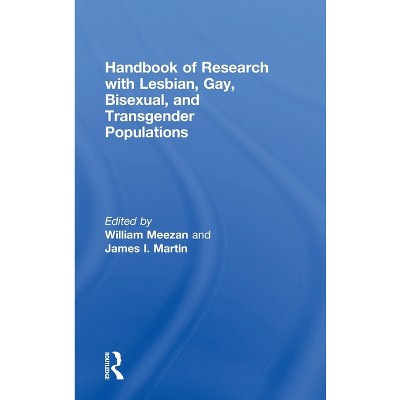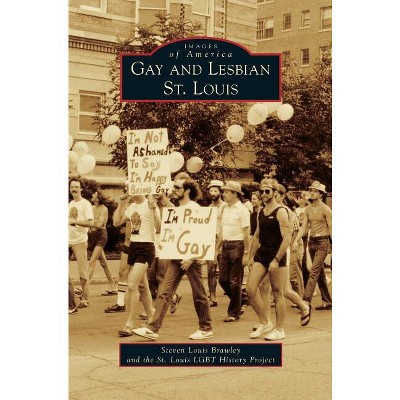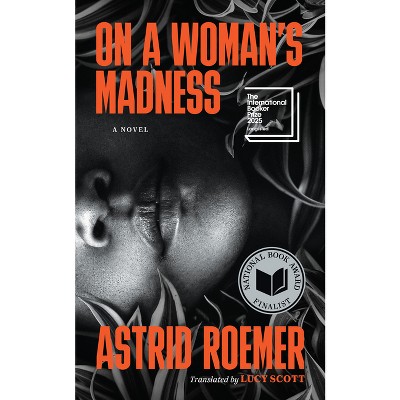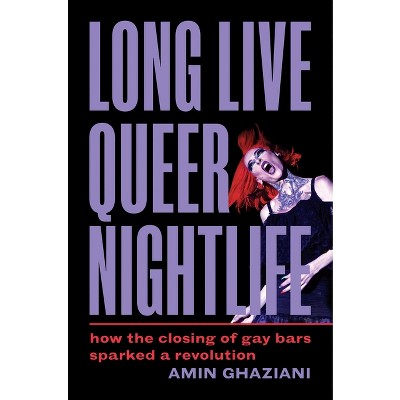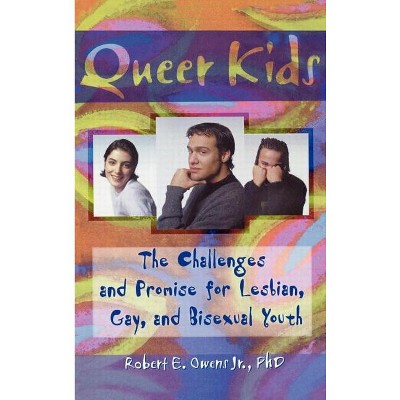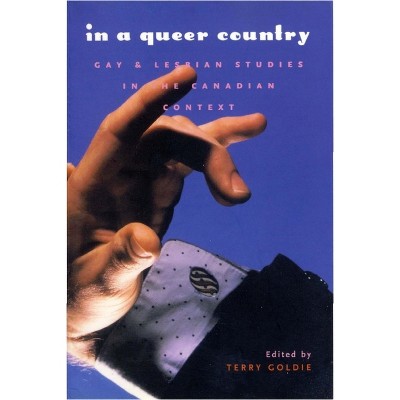Sponsored

Queer Career - by Margot Canaday (Hardcover)
$39.95
In Stock
Eligible for registries and wish lists
Sponsored
About this item
Highlights
- A masterful history of the queer workforce in America Workplaces have traditionally been viewed as "straight spaces" in which queer people passed.
- About the Author: Margot Canaday is professor of history at Princeton University.
- 312 Pages
- Social Science, LGBT Studies
Description
About the Book
"A masterful history of the LGBT workforce in AmericaWorkplaces have traditionally been viewed as "straight spaces" in which queer people passed. As a result, historians have directed limited attention to the experiences of queer people on the job. Queer Career rectifies this, offering an expansive historical look at sexual minorities in the modern American workforce. Arguing that queer workers were more visible than hidden and, against the backdrop of state aggression, vulnerable to employer exploitation, Margot Canaday positions employment and fear of job loss as central to gay life in postwar America.Rather than finding that many midcentury employers tried to root out gay employees, Canaday sees an early version of "don't ask/don't tell": in all kinds of work, as long as queer workers were discreet, they were valued for the lower wages they could be paid, their contingency, their perceived lack of familial ties, and the ease with which they could be pulled in and pushed out of the labor market. Across the socioeconomic spectrum, they were harbingers of post-Fordist employment regimes we now associate with precarity. While progress was not linear, by century's end some gay workers rejected their former discretion, and some employers eventually offered them protection unattained through law. Pushed by activists at the corporate grassroots, business emerged at the forefront of employment rights for sexual minorities. It did so, at least in part, in response to the way that queer workers aligned with, and even prefigured, the labor system of late capitalism.Queer Career shows how LGBT history helps us understand the recent history of capitalism and labor and rewrites our understanding of the queer past"--Book Synopsis
A masterful history of the queer workforce in America
Workplaces have traditionally been viewed as "straight spaces" in which queer people passed. As a result, historians have directed limited attention to the experiences of queer people on the job. Queer Career rectifies this, offering an expansive historical look at sexual minorities in the modern American workforce. Arguing that queer workers were more visible than hidden and, against the backdrop of state aggression, vulnerable to employer exploitation, Margot Canaday positions employment and fear of job loss as central to gay life in postwar America. Rather than finding that many midcentury employers tried to root out gay employees, Canaday sees an early version of "don't ask / don't tell" in all kinds of work, as long as queer workers were discreet, they were valued for the lower wages they could be paid, their contingency, their perceived lack of familial ties, and the ease with which they could be pulled in and pushed out of the labor market. Across the socioeconomic spectrum, they were harbingers of post-Fordist employment regimes we now associate with precarity. While progress was not linear, by century's end some gay workers rejected their former discretion, and some employers eventually offered them protection unattained through law. Pushed by activists at the corporate grass roots, business emerged at the forefront of employment rights for sexual minorities. It did so, at least in part, in response to the way that queer workers aligned with, and even prefigured, the labor system of late capitalism. Queer Career shows how queer history helps us understand the recent history of capitalism and labor and rewrites our understanding of the queer past.Review Quotes
"Margot Canaday breaks new ground through this history of gay and lesbian workers in modern US history. . . . [A]n excellent, much-needed corrective to a historiography that--with important exceptions--has eschewed the history of queer workers. Canaday balances her systemic analysis by weaving in the voices and experiences of individual gay and lesbian workers, which helps to humanize this history and make abundantly clear the importance of work to the lives of queer people."---Sara Smith-Silverman, American Historical Review
"Stunning. . . . The analytic pay-off of Canaday's narrative is enormous. Her discovery of the postwar bargain and its decline should transform the narrative of postwar liberalism. . . . As powerful as Canaday's arguments are, the triumph of this book is in the individual stories it tells. Queer Career is, first and foremost, a book about the lives of working people."---Reuel Schiller, Jotwell
"Queer Career sets out to reveal an experience of exploitation and a history of rights struggles--ambiguous as all such struggles are. What it shows beyond this is the possibility, in these origins, of a new language of labor."---Gabriel Winant, Modern American History
"A significant contribution to studies of work. [Queer Career] interrogates how work has shaped the lives of queer workers and demonstrates how work can be simultaneously empowering and exploitative."---Patti Giuffre, American Journal of Sociology
"Co-Winner of the Philip Taft Prize in Labor History, Labor and Working-Class History Association"
"Shortlisted for the LGBTQ+ Studies Lammy Award, Lambda Literary"
"Winner of the Hagley Prize in Business History, Business History Association"
"Finalist for the PROSE Award in North American and US History, Association of American Publishers"
"This is the rare academic book that brought tears to my eyes thanks to its poignancy, rather than out of boredom. It serves as a model of how the history of neoliberalism could and should be written: with concerted attention to categories of race, gender, sexuality, class, and their interaction, rendered with sensitivity and attentive to the subjectivity and dignity of the historical actors it portrays."---Lily Geismer, Chronicle of Higher Education
"A fascinating and thought-provoking look into the relationship between sexual orientation and employment."-- "Library Journal"
About the Author
Margot Canaday is professor of history at Princeton University. She is the author of The Straight State: Sexuality and Citizenship in Twentieth-Century America (Princeton).Dimensions (Overall): 9.3 Inches (H) x 6.1 Inches (W) x 1.3 Inches (D)
Weight: 1.37 Pounds
Suggested Age: 22 Years and Up
Number of Pages: 312
Genre: Social Science
Sub-Genre: LGBT Studies
Publisher: Princeton University Press
Theme: General
Format: Hardcover
Author: Margot Canaday
Language: English
Street Date: January 31, 2023
TCIN: 91573458
UPC: 9780691205953
Item Number (DPCI): 247-34-9786
Origin: Made in the USA or Imported
If the item details aren’t accurate or complete, we want to know about it.
Shipping details
Estimated ship dimensions: 1.3 inches length x 6.1 inches width x 9.3 inches height
Estimated ship weight: 1.37 pounds
We regret that this item cannot be shipped to PO Boxes.
This item cannot be shipped to the following locations: American Samoa (see also separate entry under AS), Guam (see also separate entry under GU), Northern Mariana Islands, Puerto Rico (see also separate entry under PR), United States Minor Outlying Islands, Virgin Islands, U.S., APO/FPO
Return details
This item can be returned to any Target store or Target.com.
This item must be returned within 90 days of the date it was purchased in store, shipped, delivered by a Shipt shopper, or made ready for pickup.
See the return policy for complete information.
Trending Non-Fiction

$19.31
was $20.98 New lower price
4 out of 5 stars with 65 ratings

$18.28
was $19.58 New lower price
4.7 out of 5 stars with 17 ratings

$4.59
MSRP $7.99
Buy 2, get 1 free select books
4.8 out of 5 stars with 123 ratings

$6.20
MSRP $10.95
Buy 2, get 1 free select books
4.8 out of 5 stars with 33 ratings

$7.09
MSRP $9.99
Buy 2, get 1 free select books
4.9 out of 5 stars with 46 ratings
